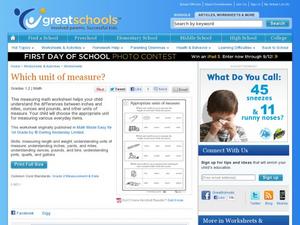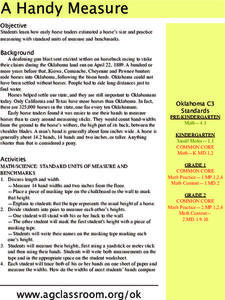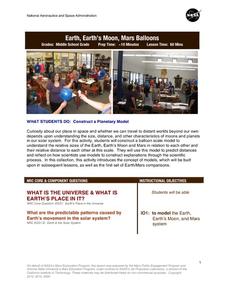Curated OER
Units of Measurement
Challenge your second graders with a worksheet on units of measurement! Not only do they put their measurement skills to the test, but kids practice word problem strategies as well. The second part of the resource prompts learners to...
Curated OER
Which Unit of Measure
Would you use inches or miles to measure a finger? How would you measure the water in a pool, or milk in a carton? Reinforce units of measurement with your first grade class. Learners circle the correct unit of measurement for each...
Curated OER
Measurement Problems
What measurements are shown on these rulers? Learners read eight rulers and record the indicated lengths in centimeters. There are no fraction answers. Remind kids to write the units into the measurements. Extend this by assigning...
Curated OER
Measurement Problems
Would you use a ruler to measure the length of a soccer field? No way! Pupils explore four tools of the trade: yardstick, measuring wheel, tape measure, and ruler. They label 12 measuring tasks with the most appropriate tool. Some of...
Curated OER
A Handy Measure
Hold your horses! Young learners discover the history behind measuring the height of horses "by hands." They also study the history of Oklahoma, and how horses played such an important role in settling the state. An excellent worksheet...
Curated OER
Are You Full of Hot Air?
Explore the concept of measuring and recording circumference. In this physical science and measurement lesson, young learners blow up balloons, measure the circumference, and record the data on an interactive graphing website.
NASA
Solar System Scale & Size
Use a variety of whole fruits to represent the different planets in the solar system to introduce scale sizes to your math or space science class. They follow suit by creating a non-scaled model of the solar system using specific-colored...
NASA
Earth, Earth’s Moon, Mars Balloons
Very specific diameters are given for blowing up three different balloons to represent, in scale, the moon, Earth, and Mars. In groups of three, amateur astronomers explore scale measurements and distance in space.
Curated OER
How Big is a Foot?
Introducing measurement can be as simple as reading a book and then using measurement tools to understand how big a foot really is. The class reads and discusses the book How Big is a Foot? by Rolf Myller, stopping often to consider the...
Curated OER
No Foot, No Horse
Why do horses wear shoes? Why do people wear shoes? Using worksheets, which are embedded in the plan, learners write descriptive paragraphs about their own shoes, classify a pile of shoes, and also engage in math games about the variety...
Curated OER
Graphing Memories
Mem Fox’s Wilfrid Gordon McDonald Partridge provides the labels for a graphing activity. Class members create an illustration of a memory item brought from home, and place their illustration in the proper column of a graph. When the...
Curated OER
Mighty Oaks from Little Acorns
What does it mean to grow? To germinate? For the plan detailed here, class members investigate the growth process of an oak tree while focusing on the beginning stages of planting and germination. They plant seeds and record observations...
Curated OER
Pumpkins By the Pound
Use pumpkins of various sizes to experiment with weight and perimeter. First the class lifts the pumpkins one by one, estimating each pumpkin's weight. They arrange the pumpkins from lightest to heaviest, and then string weigh each one...
Institute of Electrical and Electronics Engineers
Clipper Creations
Students create their own model of a nail clipper. They practice using engineering design and model building. They also identify different kinds of small levers.
Curated OER
Garden Grid
Basically, your class reads about different garden plants from an included handout and seed packets that you provide, and then uses a grid to plan out where to place the plants. They can practice counting with the seeds, grouping,...
Institute of Electrical and Electronics Engineers
Pollution Patrol
Students design and build an outdoor air pollution detector, test their designs, and communicate their results. In this investigative instructional activity students work in teams to design their detectors and use everyday items to do...
Curated OER
Agriculture in Motion
Youngsters learn about simple machines that could be used on a farm. They learn about agricluture, listen to a farmer speak, compare and contrast different farm machines, and then design their own. Note that although the publisher...
Alabama Learning Exchange
Seeds: How They Grow
Students observe the growing stages of plants. In this plant growth lesson, students collect, germinate, and plant seeds to chart the growth process of plants.
Curated OER
Working Watermelon
You're going to wish you had a watermelon for this lesson! Class members read about watermelons and make a salad in class to sample. They also perform estimates, measurements and calculations on a watermelon. They predict what percentage...
Curated OER
Ag In The Outfield
Young scholars explore baseball. This is a cross-curricular plan that includes math, history, and agriculture. Pupils use their five senses to observe the materials a baseball is made from and identify the agricultural products used. In...
Curated OER
Mighty Earth Movers
Note that although the publisher lists almost all of the Common Core standards for both math and language arts, you will most likely want to take the general topic and choose which area to focus on. Regarding math, pupils measure worms...
University of Texas
Inside Mathematics: High Horse [Pdf]
This task challenges a student to demonstrate understanding of measurement.
Better Lesson
Better Lesson: Estimate Length in Inches
Second graders will be able to estimate the lengths of objects by mentally partitioning the lengths into inches. A video, worksheets, and a detailed lesson plan are included.
Teachnology
Teachnology: Measurement Teaching Theme
Measurement Teaching Theme provides an excellent collection of free sample worksheets, teacher resources, lesson plans and interactive media for the elementary grades.























![Inside Mathematics: High Horse [Pdf] Lesson Plan Inside Mathematics: High Horse [Pdf] Lesson Plan](https://d15y2dacu3jp90.cloudfront.net/images/attachment_defaults/resource/large/FPO-knovation.png)

